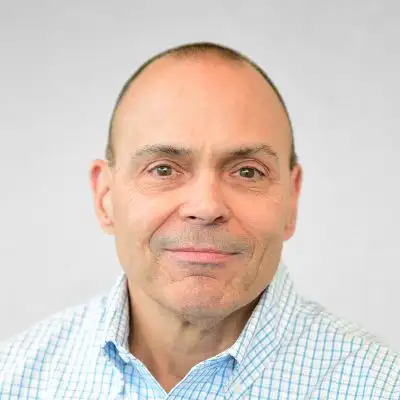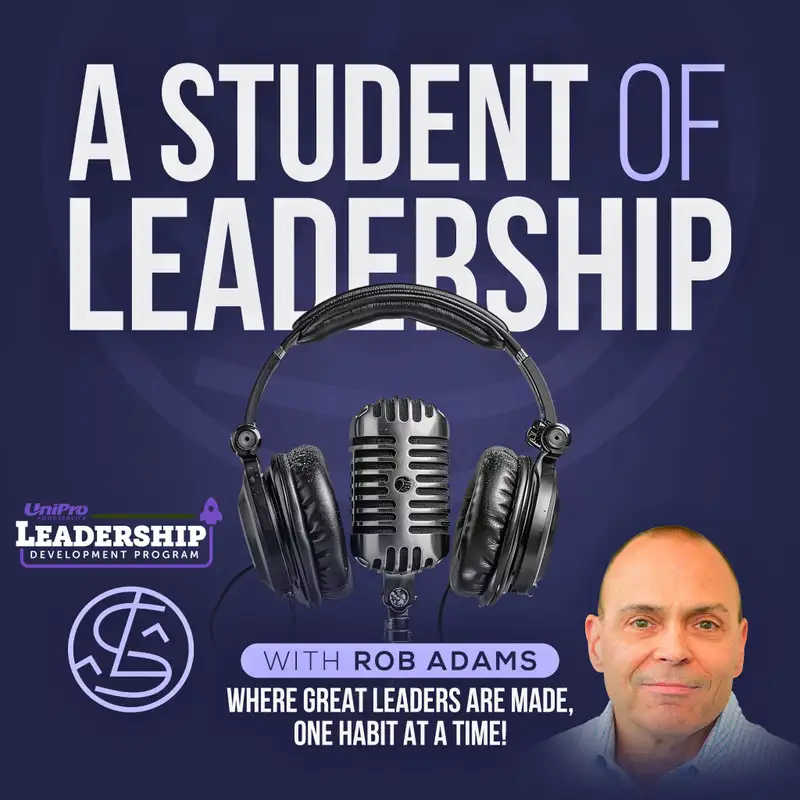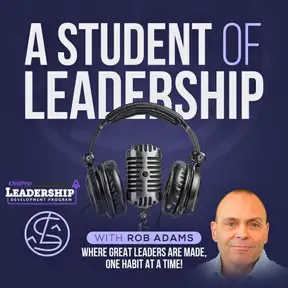Episode 21 - Leadership Reflection
Download MP3Welcome to a student of leadership, a micro podcast where leaders are made one habit at a time. Hosted by Rob Adams, a leadership veteran with thirty years of experience. This podcast explores key concepts that define exceptional leadership. Each episode delves into a powerful word or strategy, offering practical insights and real world stories. Whether you're just starting out or an experienced executive, join Rob as he guides you in learning, growing, and leading with purpose.
Rob Adams:Hey, everyone. Welcome back to A Student of Leadership, the Micro Podcast where great leaders are made one habit at a time. I'm Rob Adams, and today we're exploring a practice that transforms experience into wisdom. The word of this week is reflection. In our action packed oriented world, the art of purposeful reflection has become increasingly rare, yet increasingly valuable.
Rob Adams:It's not just about looking back, it's about looking deeper, seeing patterns and extracting insights that will inform future decisions. For leaders, reflection is the difference between having twenty years of experience and having one year of experience repeated 20 times. In this episode, we'll uncover how strategic reflection can revolutionize your leadership impact, share a powerful historical example of reflection in action, and provide practical frameworks to make meaningful reflection a natural part of your leadership practice. Consider Abraham Lincoln's profound practice of reflection during the civil war. In what he called his quiet hours, typically between 11PM and 2AM, Lincoln would write what became known as his hot letters, emotional responses to critics, generals, and cabinet members that he never intended to send.
Rob Adams:These letters served as a form of structured reflection, allowing him to process complex emotions and decisions without acting on immediate impulses. One famous example occurred after the union's devastating loss at Fredericksburg. Instead of immediately relieving general Burnside of command, as many had advised, Lincoln spent several nights reflecting through writing. This deliberate reflection led him to realize that failure wasn't solely Burnside's. The entire command structure needed reform.
Rob Adams:This insight led to a reorganization of the Army of the Potomac, a decision that proved crucial to the Union's eventual victory. Now Lincoln's reflective practice wasn't just personal therapy. It was a strategic tool that helped him navigate the nation through its darkest hours with wisdom, empathy, and clear judgment. Peter Drucker's observation that follow effective action with quiet reflection. From the quiet reflection will come even more effective action.
Rob Adams:It illuminates in a fundamental truth about leadership growth. The most impactful leaders don't just accumulate experiences, they metabolize them through reflection, turning raw experience into refined wisdom. Now let's review some reflection questions. What patterns emerge when you look back at your most successful and challenging leadership moments? How might regular reflection change the quality of your daily decisions?
Rob Adams:And what prevents you from reflecting more deeply and how can you overcome these barriers? A 2022 Harvard Business School study titled Learning from A Meta Analysis revealed that structured reflection increases leadership effectiveness by up to 23% over time. More surprisingly, leaders who practice regular reflection report 37% better decision making confidence and 45% higher team trust scores, suggesting that reflection's benefits extend far beyond personal insights. Now here are three transformative approaches to leadership reflection. Number one, design reflection rituals.
Rob Adams:Create specific moments for different types of reflection, daily wins and learnings, weekly progress toward goals, monthly strategy reviews, and quarterly deep dives into personal growth. Each level of reflection serves as a distinct purpose in your leadership development. Number two, practice triple loop reflection. Move beyond basic what happened reflection to examine your thinking patterns and underlying assumptions. Ask what happened?
Rob Adams:Why did I think, act in that way? What beliefs or assumptions influenced my choices? And number three, implement reflection partners. Establish regular reflection sessions with a trusted peer or mentor. An external perspective can help uncover blind spots and challenge your thinking in ways solo reflection cannot.
Rob Adams:Remember that effective reflection isn't about dwelling on the past. It's about mining your experiences for insights that shape your future. Your action challenge for this week is to create a leadership learning log with three columns: situations, insights, and applications. Each day, document one significant leadership moment, what you learned from it, and how you'll apply that learning in the future. At week's end, look for patterns and themes that could inform your leadership approach.
Rob Adams:Reflection is the bridge between experience and expertise, between action and wisdom. As you work on this week's action challenge, remember that every experience holds lessons waiting to be discovered through thoughtful reflection. Now next week, we'll explore discipline, not as a rigid set of rules, but as a powerful framework for turning your leadership aspirations into consistent, impactful action. Until then, keep practicing seeing the habits that make great leaders. And remember, great leaders are made one habit at a time.
Rob Adams:See you next time on a student of leadership. Take care, everybody.
Otro:Thanks for tuning into this episode of the student of leadership. Leadership is about who we become and how we help others grow. If you found value in this podcast, share it with a fellow leader and connect with Rob on LinkedIn or leave a review. New episodes drop weekly, so don't forget to subscribe to stay connected. Until next time, keep learning, growing, and leading with intention.
Otro:Remember, great leaders are made one habit at a time. See you next time on a student of leadership.
Creators and Guests


